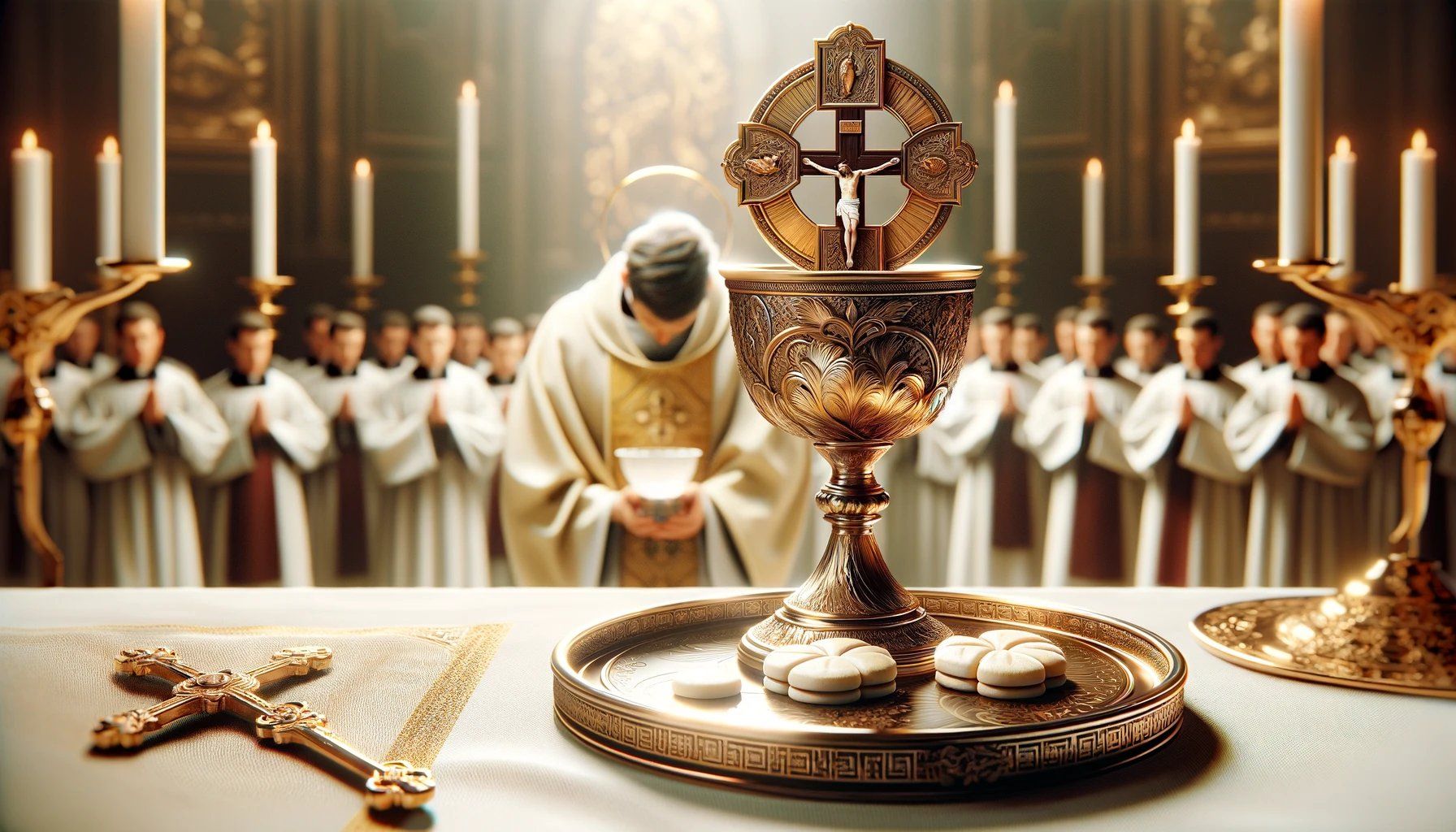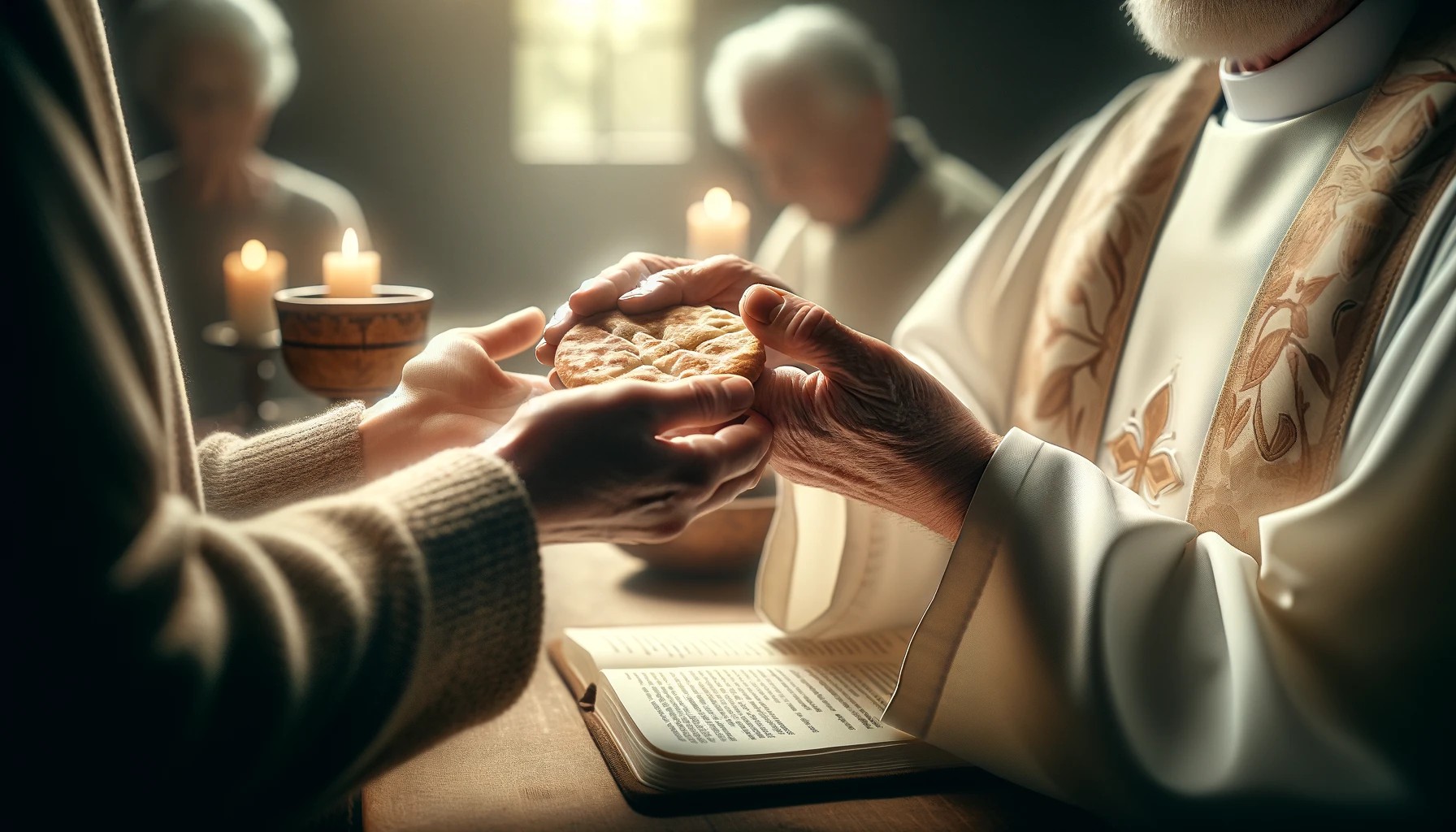Home>Theology and Spirituality>Catholic: Why Would A Person Refuse To Take Communion If They Are Not In Sin


Theology and Spirituality
Catholic: Why Would A Person Refuse To Take Communion If They Are Not In Sin
Published: February 25, 2024
Peter Smith, Editorial Director at Christian.net, combines deep insights into faith, politics, and culture to lead content creation that resonates widely. Awarded for his contributions to religious discourse, he previously headed a major organization for religious communicators, enhancing dialogue on faith's societal impacts.
Discover the reasons behind refusing communion when not in sin. Explore the theological and spiritual implications in Catholicism.
(Many of the links in this article redirect to a specific reviewed product. Your purchase of these products through affiliate links helps to generate commission for Christian.net, at no extra cost. Learn more)
Table of Contents
Introduction
The Catholic sacrament of Communion, also known as the Eucharist, holds profound significance within the faith. It is a sacred ritual that symbolizes the body and blood of Jesus Christ and is central to the Catholic Mass. However, there are instances where individuals, even those who identify as Catholic, may choose to abstain from receiving Communion. This decision may raise questions and curiosity among both Catholics and non-Catholics alike. Understanding the reasons behind this choice requires a deeper exploration of the theological, personal, and spiritual aspects that influence an individual's decision in this regard. In the following sections, we will delve into the complexities surrounding the act of refusing to take Communion, shedding light on the multifaceted considerations that may lead a person to make this decision.
Read more: Why Do Catholics Take Communion
Understanding the Catholic Sacrament of Communion
The Catholic sacrament of Communion, also referred to as the Eucharist, holds a central place in the faith and practice of the Catholic Church. It is considered one of the seven sacraments, which are sacred rituals instituted by Jesus Christ. During the celebration of the Mass, the Eucharist is consecrated by the priest, transforming the bread and wine into the body and blood of Christ through the process of transubstantiation, a fundamental belief in Catholic theology.
Participation in the Eucharist is a deeply spiritual and communal experience for Catholics. It signifies the unity of the faithful as they partake in the body and blood of Christ, reinforcing their connection to the Church and to one another. The act of receiving Communion is seen as a source of grace, a means of spiritual nourishment, and a symbol of the ongoing presence of Christ among his followers.
The significance of the Eucharist is rooted in the Last Supper, where Jesus shared bread and wine with his disciples, instructing them to partake in remembrance of him. This event forms the basis of the Eucharistic celebration in the Catholic tradition, emphasizing the sacrificial aspect of Christ's death and the promise of eternal life through the sharing of his body and blood.
Catholics believe that through the reception of Communion, they are united with Christ and with the entire body of believers, transcending the boundaries of time and space. This profound spiritual union is a cornerstone of Catholic faith and is approached with reverence, awe, and a deep sense of sacredness.
In summary, the Catholic sacrament of Communion is a deeply meaningful and sacred practice that embodies the spiritual nourishment and communal unity of the faithful. Its theological significance, rooted in the teachings of Jesus and the traditions of the Church, underscores its centrality in the life of Catholic believers.
Reasons for Refusing to Take Communion
There are various reasons why a person, particularly a Catholic, may choose to abstain from receiving Communion during the Eucharistic celebration. These reasons are deeply personal and can stem from theological, spiritual, and individual convictions. It's important to recognize that the decision to refrain from taking Communion is often a thoughtful and conscientious choice, influenced by a range of factors that shape an individual's relationship with their faith and the Church.
State of Grace
One of the primary reasons for abstaining from Communion is the belief in the necessity of being in a state of grace. According to Catholic teaching, individuals are encouraged to receive the Eucharist only if they are in a state of grace, meaning they are free from mortal sin. For Catholics, mortal sin is considered a grave violation of God's law, leading to a rupture in the relationship with God. Those who are conscious of having committed a mortal sin are encouraged to seek the sacrament of reconciliation, also known as confession, before receiving Communion. As a result, individuals who are grappling with unresolved sin may choose to refrain from partaking in the Eucharist out of reverence for its sacredness and in acknowledgment of the need for spiritual reconciliation.
Doctrinal Differences
In some cases, individuals may find themselves in theological disagreement with certain teachings or doctrines of the Catholic Church. These disagreements can pertain to matters of faith, morality, or Church governance. As a result, individuals who hold divergent theological views may opt to abstain from receiving Communion as a reflection of their conscientious objection to specific aspects of Catholic doctrine. This decision may stem from a deep commitment to personal beliefs and a desire to maintain integrity in matters of faith and conscience.
Read more: Why Can Lutherans Take Catholic Communion
Spiritual Preparation
Another reason for declining Communion may revolve around the need for spiritual preparation and discernment. Some individuals may choose to abstain from receiving the Eucharist as a means of engaging in a period of reflection, prayer, or spiritual discernment. This intentional pause from Communion can serve as a time for personal introspection, seeking spiritual clarity, or addressing specific concerns or challenges within one's faith journey. By refraining from partaking in the Eucharist during this period, individuals may seek a deeper connection with their spiritual life and a renewed sense of readiness to fully embrace the sacrament.
Respect for the Sacred
Additionally, individuals may choose to abstain from Communion as an expression of reverence for the sacred nature of the Eucharist. This decision reflects a profound respect for the significance of the sacrament and a desire to approach it with the utmost reverence and sincerity. By refraining from receiving Communion, individuals may demonstrate a deep appreciation for the holiness of the Eucharist and a commitment to upholding its sanctity within the context of their personal faith practice.
In essence, the decision to refuse Communion is shaped by a complex interplay of spiritual, theological, and personal considerations. It underscores the deeply individual nature of faith and the multifaceted factors that inform one's relationship with the Eucharist and the Catholic Church.
Personal Convictions and Beliefs
Personal convictions and beliefs play a pivotal role in shaping an individual's decision to refuse Communion within the Catholic faith. These deeply held convictions are often rooted in a profound sense of personal spirituality, moral discernment, and conscientious reflection on matters of faith and practice.
At the heart of this aspect lies the unique and deeply personal relationship that individuals have with their faith and the teachings of the Catholic Church. For some, this may involve a conscientious commitment to upholding specific moral or ethical principles that they believe align with their understanding of Christian values. This may lead them to abstain from receiving Communion if they perceive a misalignment between their personal convictions and the act of partaking in the Eucharist.
Furthermore, personal beliefs regarding the nature of the Eucharist and its theological significance can significantly influence an individual's decision. Some individuals may hold nuanced theological perspectives that shape their understanding of the sacrament, leading them to approach Communion with a heightened sense of reverence and discernment. This may result in a deliberate choice to refrain from receiving the Eucharist, driven by a deeply held belief in the sacredness of the ritual and a desire to approach it with utmost sincerity and spiritual integrity.
Moreover, personal convictions and beliefs are often intertwined with an individual's spiritual journey and evolving understanding of their faith. This may encompass a period of introspection, discernment, or grappling with theological questions that prompt individuals to approach the reception of Communion with a heightened sense of mindfulness and spiritual preparation. In such instances, the decision to abstain from Communion serves as a testament to the individual's commitment to engaging in a thoughtful and intentional exploration of their faith, seeking to align their beliefs with their spiritual practices.
Ultimately, personal convictions and beliefs form the bedrock of an individual's decision to refuse Communion, reflecting the deeply personal and nuanced nature of their relationship with their faith, the Eucharist, and the teachings of the Catholic Church. This aspect underscores the rich tapestry of individual spirituality and the diverse ways in which personal convictions shape one's approach to the sacred rituals and traditions within the Catholic faith.
Respect for the Sacrament and Church Teachings
Respect for the sacrament of Communion and adherence to the teachings of the Catholic Church are fundamental considerations that may lead individuals to refuse to take Communion. This aspect is deeply rooted in a profound reverence for the Eucharist as a sacred ritual and a demonstration of fidelity to the doctrinal principles upheld by the Church.
At the core of this perspective lies a deep appreciation for the sanctity of the Eucharist as the body and blood of Christ. Individuals who choose to abstain from receiving Communion out of respect for the sacrament often do so as a testament to their reverence for the divine presence believed to be manifest in the consecrated elements. This reverence extends beyond a mere symbolic understanding of the Eucharist and encompasses a profound acknowledgment of the real presence of Christ in the sacrament, a belief central to Catholic doctrine.
Furthermore, the decision to refuse Communion as an expression of respect for the sacrament is closely intertwined with a commitment to upholding the teachings and traditions of the Catholic Church. It reflects a conscientious adherence to the Church's guidance on the reception of the Eucharist, particularly in cases where individuals may perceive a misalignment between their personal circumstances and the doctrinal requirements for receiving Communion. This adherence to Church teachings underscores a deep sense of loyalty to the authority and wisdom of the Church, acknowledging its role as a custodian of sacred traditions and theological truths.
Additionally, the act of abstaining from Communion out of respect for the sacrament and Church teachings serves as a demonstration of humility and spiritual discernment. It reflects an individual's willingness to approach the Eucharist with a sense of reverence and sincerity, recognizing the solemnity of the ritual and the need for spiritual readiness. This intentional act of humility and discernment underscores a profound commitment to engaging with the Eucharist in a manner that aligns with the spiritual and doctrinal precepts upheld by the Catholic faith.
In essence, the decision to refuse Communion out of respect for the sacrament and Church teachings embodies a deep reverence for the Eucharist as the real presence of Christ and a steadfast commitment to honoring the doctrinal principles and spiritual guidance of the Catholic Church. It reflects the intricate interplay between personal faith, reverence for sacred rituals, and the fidelity to the teachings of the Church, underscoring the multifaceted considerations that inform an individual's approach to the reception of the Eucharist.
Read more: Why Do Pentecostals Take Communion
Conclusion
The decision to refuse Communion within the Catholic faith is a multifaceted and deeply personal choice that encompasses theological, spiritual, and individual considerations. It reflects the intricate interplay between personal convictions, reverence for the sacrament, and a commitment to upholding the teachings of the Catholic Church. Whether rooted in a conscientious commitment to spiritual readiness, a profound respect for the sanctity of the Eucharist, or a deep-seated adherence to personal beliefs, the act of abstaining from receiving Communion underscores the diverse and nuanced nature of individual faith journeys.
At its core, the decision to refuse Communion serves as a testament to the rich tapestry of individual spirituality and the diverse ways in which personal convictions shape one's approach to the sacred rituals and traditions within the Catholic faith. It embodies a profound sense of reverence for the Eucharist as the real presence of Christ and a steadfast commitment to honoring the doctrinal principles and spiritual guidance of the Catholic Church. This intentional act of humility and discernment underscores a profound commitment to engaging with the Eucharist in a manner that aligns with the spiritual and doctrinal precepts upheld by the Catholic faith.
Ultimately, the act of refusing Communion invites contemplation on the deeply personal and nuanced aspects of faith, inviting individuals to engage in a thoughtful exploration of their spiritual beliefs and relationship with the Eucharist. It underscores the importance of individual conscience, spiritual discernment, and a conscientious commitment to upholding one's beliefs within the context of the Catholic tradition. As such, the decision to abstain from receiving Communion stands as a poignant reflection of the diverse and deeply personal expressions of faith that shape the lived experiences of Catholic believers.
In essence, the act of refusing Communion within the Catholic faith is a profound and deeply personal choice that reflects the intricate interplay of theological, spiritual, and individual considerations. It embodies a deep reverence for the Eucharist as the real presence of Christ and a steadfast commitment to honoring the doctrinal principles and spiritual guidance of the Catholic Church. This intentional act of humility and discernment underscores a profound commitment to engaging with the Eucharist in a manner that aligns with the spiritual and doctrinal precepts upheld by the Catholic faith.













